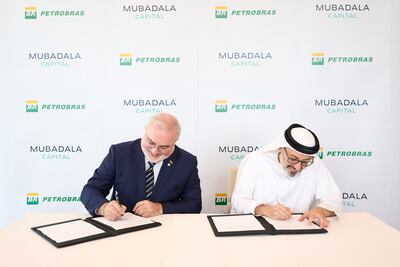Brazil’s Petrobras has signed an initial agreement with Mubadala Capital, the asset management subsidiary of Abu Dhabi’s Mubadala Investment Company, to potentially invest in a biofuel project.
The project, in Brazil's north-eastern state of Bahia, was first announced in April as part Mubadala Capital’s plan to invest $2.5 billion in the next 10 years to produce renewable diesel and sustainable aviation kerosene in the South American country.
The investment is being made through Acelen, a refinery owned by Mubadala Capital.
“The production of renewable energy from agricultural crops that are native to Brazil is an innovative and exciting undertaking, with the potential to positively transform Brazil and the global energy landscape for generations to come,” Oscar Fahlgren, chief investment officer and head of Brazil at Mubadala Capital, said in a statement on Monday.
“This agreement underscores Mubadala Capital and Petrobras’ shared commitment to energy transition and we are excited to work alongside Petrobras to create a novel, carbon neutral, product that will speed up the transition into a sustainable future.”

Acelen, which owns the Mataripe Refinery in Bahia, Brazil's second-biggest and one of the oldest in the country, is expected to start production in the first quarter of 2026.
Brazil is the UAE's top trading partner in Latin America and ranks second only to the US among the UAE's most important trading partners in the Americas.
The Emirates’ non-oil trade with Brazil reached $4.3 billion last year, an annual growth of 32 per cent, according to figures from the UAE's Ministry of Economy.
The two countries collaborate in sectors such as industry, transport, shipping, storage, infrastructure, construction, port management, energy, mining, banking and finance, and property.
“This memorandum of understanding is aligned with our strategic vision, which seeks to prepare Petrobras for a more sustainable future and contribute to the success of our energy transition plans,” said Jean Paul Prates, chief executive of Petrobras.
“We are excited to explore investment opportunities in this project, which we believe will further diversify Petrobras’ portfolio and support our goal of becoming emissions neutral by 2050.”
Mubadala Capital created Acelen to operate the Mataripe Refinery and its related logistics assets.
In 2021, Mubadala bought the refinery and logistics assets, known at the time as Landulpho Alves Refinery, from Petrobras for $1.65 billion.
Mubadala Capital oversees two funds in Brazil focused on special opportunities, as well as a series of co-investment vehicles, special-purpose vehicles and continuation funds, its website says.
The International Air Transport Association estimates that sustainable aviation fuel (SAF) could contribute about 65 per cent of the reduction in emissions needed by the aviation industry to reach its goal of net zero by 2050.
Achieving the target requires a major increase in production to meet demand.
The largest boost in production is expected in the 2030s as government support becomes global, SAF becomes competitive with fossil kerosene and credible offsets become scarcer, the airlines trade body has said.

